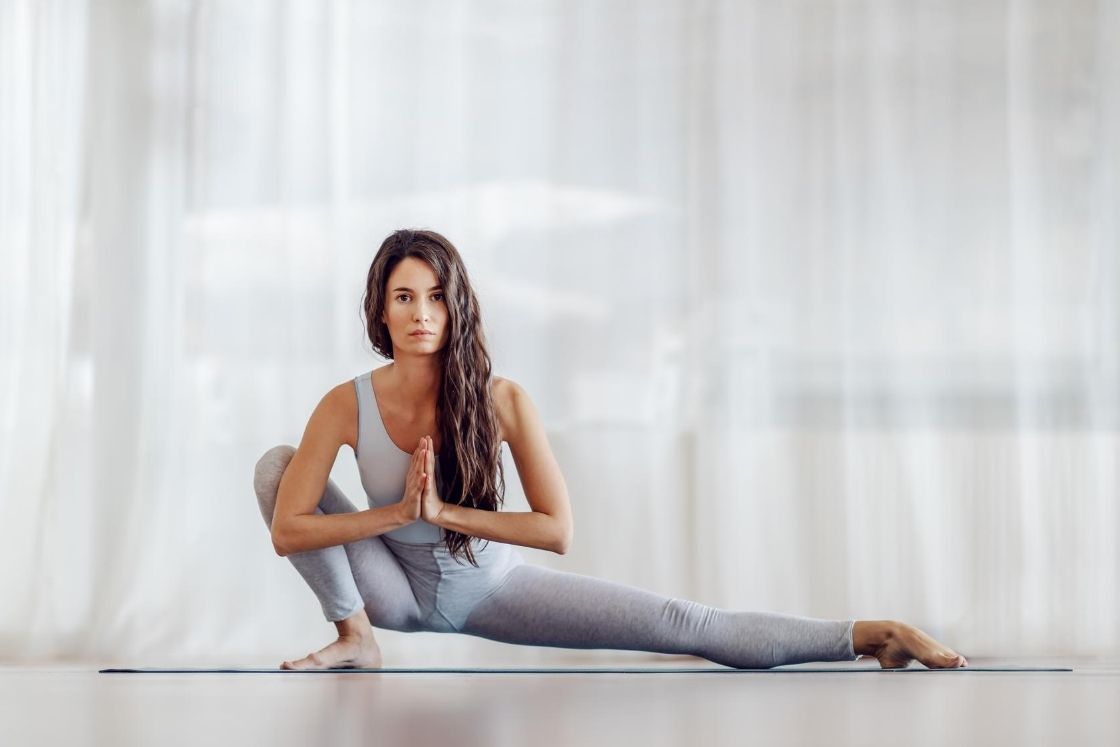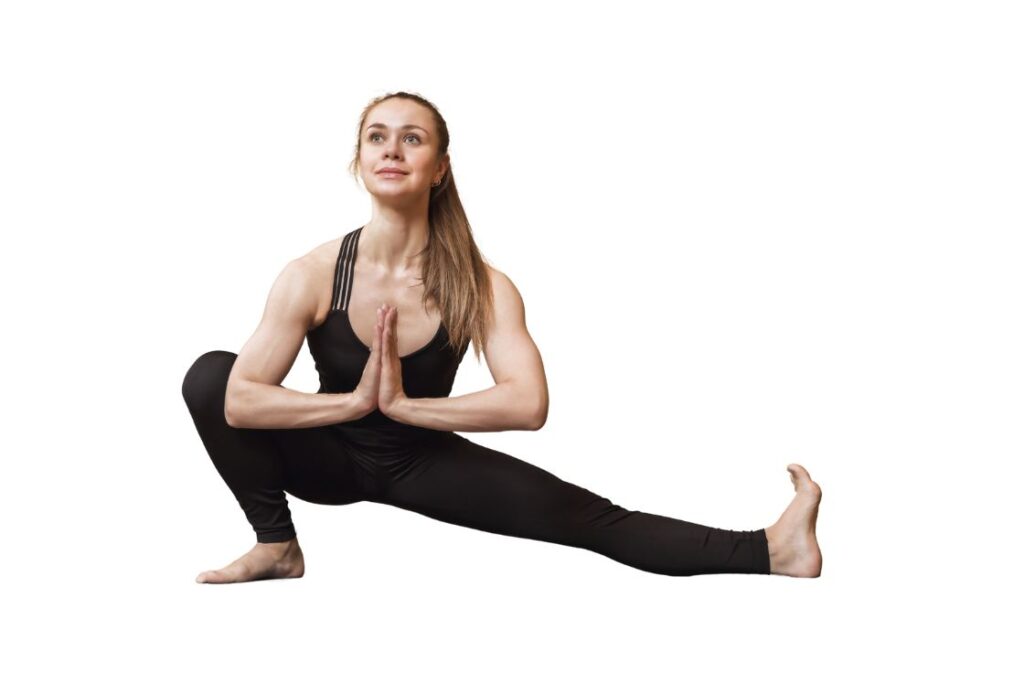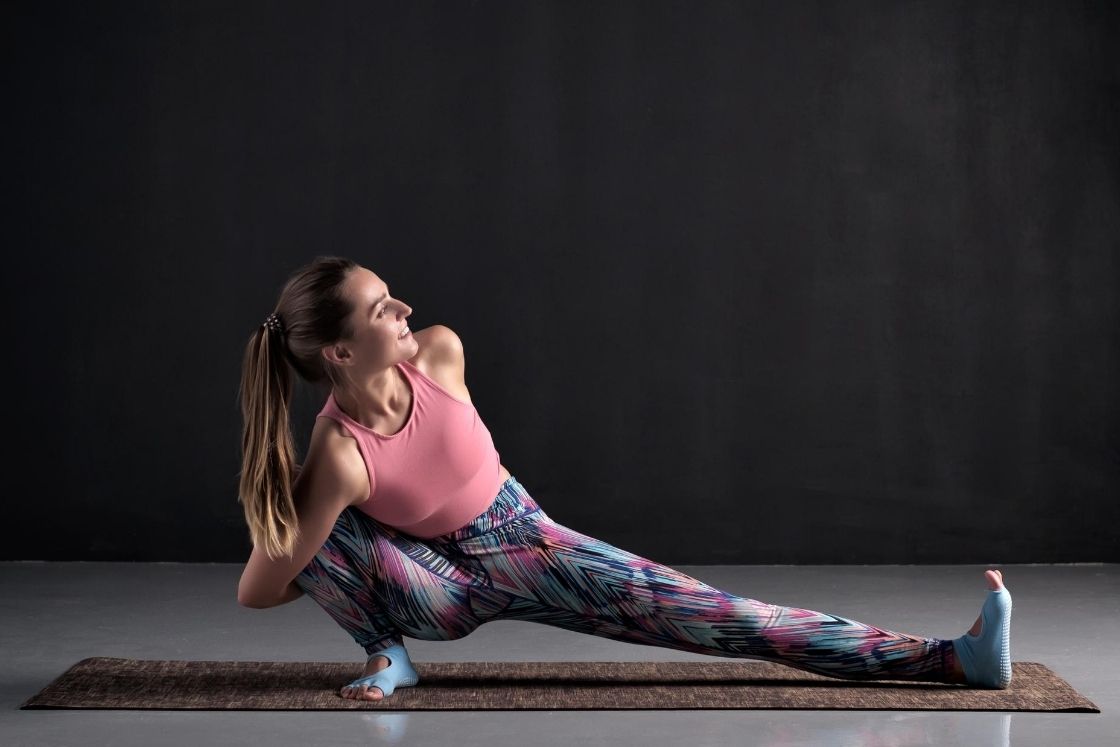
| Sanskrit Pronunciation | Skandasana (SKAHN-dahs-uh-nuh) |
| That means | Skanda = Warrior / Asana = Pose |
| Pose Sort | Aspect Lunge, Hip Opener |
| Pose Degree | Intermediate to Superior |
| Anatomy | Hips, glutes, hamstrings, quadriceps, knees, ankles |
| Different Names | Aspect Lunge Pose, Warrior’s Lunge, Skanda Pose |
Skandasana, also called the Aspect Lunge Pose, is a dynamic yoga posture that considerably enhances decrease physique flexibility, power, and mobility. Focusing on the hips, glutes, hamstrings, and quadriceps, this pose is a key part of any hip-opening sequence. Whether or not built-in right into a yoga movement or practiced independently, Skandasana supplies a deep stretch whereas difficult stability and stability, making it each bodily rewarding and mentally participating.
Incorporating Skandasana into your routine builds decrease physique power and improves total stability and alignment. This dynamic pose promotes aware motion, boosting physique consciousness and coordination. As you shift your weight from one leg to the opposite, Skandasana not solely stretches and prompts tight muscle groups but additionally tones them, enhancing flexibility and resilience in every day actions.
That means
In Skandasana, the time period “Skanda” refers to a warrior‘s place throughout an assault, and “asana” means “pose.” This pose is devoted to Kartikeya, the elder son of Lord Shiva and the god of battle. The aspect lunge place of Skandasana resembles a battle-ready stance, evoking the picture of a warrior making ready for fight. As such, the pose is also called the “pose of the battle god,” reflecting its robust, assertive stance and its affiliation with martial power and readiness.
Mythology
In response to the epic poem Kumarsambhava by Kalidasa, the demon Taraka was inflicting nice disturbance among the many gods. He had obtained a boon that he might solely be killed by the son of Lord Shiva. To deal with this, Goddess Parvati approached Shiva, who was deep in meditation. To disrupt Shiva’s meditation, Kama (the god of affection) shot an arrow of want at him, which resulted in Kama being diminished to ashes when Shiva opened his third eye.
To reconcile with Shiva, Parvati embraced asceticism and non secular self-discipline, in the end marrying him. Finally, their son Kartikeya (Skanda) was born. Upon reaching manhood, Kartikeya fulfilled the prophecy by defeating and destroying the demon Taraka.
Skandasana(Aspect Lunge Pose) follow information
Skandasana gives a dynamic stretch and strength-building alternative for the decrease physique. Right here’s a information on methods to safely follow Skandasana, together with preparatory poses, steps, suggestions, precautions, contraindications, follow-up poses, and variations.
Preparatory pose
How you can do skandasana(steps)

- Stand together with your toes broad aside, about three to 4 toes, and barely flip your toes outwards.
- Shift your weight onto your proper foot, bending your proper knee whereas maintaining your left leg straight and the toes pointing upwards.
- Decrease your hips down and again, making a deep lunge together with your proper leg, and maintain your left leg prolonged.
- Place your arms on the ground in entrance of you for stability or use yoga blocks. Alternatively, convey your arms to a prayer place (Anjali Mudra) at your chest.
- Have interaction your core muscle groups to keep up stability and maintain your torso upright with relaxed shoulders.
- Maintain the pose for just a few breaths, specializing in the stretch in your inside thighs and groin whereas sustaining regular respiration.
- Slowly return to the beginning place and repeat the identical steps on the other aspect.
- After practising on each side, return to a standing place together with your toes collectively, taking a second to note the results of the pose.
Freshmen suggestions
- Place yoga blocks beneath your arms for help for those who discover it difficult to succeed in the ground, serving to with stability and alignment.
- Guarantee your bent knee is straight above your ankle and maintain your toes hip-width aside with toes barely turned outwards.
- Actively have interaction your core muscle groups to assist stabilize your torso and preserve stability all through the pose.
Precautions
- Keep away from letting your bent knee prolong past your toes to forestall pressure on the knee joint
- Preserve your again straight and chest lifted to keep away from collapsing or rounding your backbone.
- Guarantee your weight is evenly distributed to forestall overloading one aspect and to keep up stability.
- Don’t drive your self right into a deep lunge for those who really feel discomfort; work inside your vary of movement and use props if wanted.
- Preserve the prolonged leg engaged and the foot flexed to guard the hamstring and preserve alignment.
Contraindications
- Keep away from the pose when you have latest or power knee accidents, because the deep lunge can pressure the knee joint.
- Chorus from practising when you have hip accidents or circumstances that restrict hip flexibility, as it might exacerbate discomfort.
- Skip the pose when you have decrease again points or herniated discs, because the place could place undue stress on the decrease again.
- Keep away from in case you are pregnant or have any circumstances that have an effect on stability and stability, because the pose may be difficult and should have an effect on your middle of gravity.
Comply with up poses
Variations
Within the collection of lunge pose, poses like Equestrian Pose, Low Lunge Pose and Excessive Lunge Pose may be practiced.
Aspect lunge variations consist of various place of arms and higher trunk that may be practiced in following method:
1. Utthita baddha parsva upvesasana (Sure aspect lunge stretch pose)

On this variation of aspect lunge pose, arms are wrapped across the bent leg so it bounds legs and deepens the other leg stretch. To do that:
- From the completed aspect lunge pose (described above), clasp your left wrist or just your fingers together with your proper hand whereas wrapping your proper leg’s shin bone. Preserve your left foot pointing upwards and your gaze directed to the left.
2. Standing aspect lunge with ahead bend
For this variation, after reaching the ultimate place of the aspect lunge pose, straighten your trunk after which bend ahead out of your waist. On this place, your arms can relaxation in your legs or on the ground.
Props and modifications
- One can put a folded blanket beneath the heel to supply the mandatory help to the posture.
- To deepen the stretching practitioners can stability the pose on the balls of the foot; as if unable to succeed in there with the only.
- Practitioners may also place a block beneath their seats to keep away from falling because of disbalance.
Skandasana advantages
Skandasana has many advantages on your yoga follow. It stretches your hips and legs, making them extra versatile. This pose additionally strengthens your decrease physique muscle groups, helps you stability higher, and improves your core power. Training Skandasana can result in higher motion, stability, and total power.
- Enhances Decrease Physique Flexibility: Skandasana deeply stretches the hips, hamstrings, and groin. This elevated flexibility in these areas helps enhance total mobility, making on a regular basis actions like squatting and bending simpler and extra fluid.
- Strengthens Leg Muscular tissues: Holding the aspect lunge place engages and strengthens the quadriceps, glutes, and hamstrings. This elevated power helps help higher posture and stability in numerous actions, decreasing the chance of damage.
- Improves Stability and Stability: Balancing in Skandasana challenges your core and stabilizing muscle groups. Enhanced stability and stability are essential for actions that require coordination and precision, and so they contribute to higher total physique management.
- Will increase Hip Mobility: The pose opens and stretches the hip joint, which might alleviate tightness and discomfort within the hips. Improved hip mobility helps higher alignment and reduces the chance of accidents associated to restricted motion.
- Stimulates Circulation: The dynamic nature of Skandasana helps stimulate blood movement to the decrease physique. Improved circulation helps higher muscle restoration and total cardiovascular well being.
- Enhances Core Power: Partaking the core muscle groups to keep up stability and stability in Skandasana strengthens the belly muscle groups. A robust core helps higher posture, reduces again pressure, and improves total purposeful power.
- Improves Joint Alignment: Skandasana helps to align the knee and ankle joints correctly when completed with right kind. Correct alignment reduces the chance of joint ache and discomfort, particularly for people with earlier accidents.
- Balances Sacral and Root Chakras: Skandasana influences the Sacral and Root Chakra, that are related to emotions of safety, stability, and pleasure. Balancing these chakras by way of the bodily follow of the pose can improve your sense of grounding and well-being.
Conclusion
Skandasana, or Aspect Lunge Pose, is a invaluable addition to any yoga follow, offering vital advantages for each the physique and thoughts. By focusing on the hips, glutes, hamstrings, and quadriceps, this pose enhances decrease physique flexibility, strengthens core muscle groups, and helps joint well being. Its dynamic nature improves stability and stability whereas selling aware motion and physique consciousness.
Common follow of Skandasana can result in elevated flexibility, diminished stress, and higher respiratory perform. Moreover, it opens the hip joints and balances key power facilities, contributing to total bodily and psychological well-being. Integrating Skandasana into your routine may help develop a extra versatile, robust, and grounded physique, whereas fostering a peaceful and targeted thoughts.
Skandasana FAQs
Maintain Skandasana for about 20-30 seconds on both sides, or longer if snug. Concentrate on sustaining stability and a gentle breath all through the pose.
Use yoga blocks beneath your arms for help to keep up stability and alignment.
Sure, however rookies ought to use props and deal with alignment and stability. Steadily work into the pose as flexibility and power enhance.
Sure, it stretches the inside thighs, hamstrings, and hips, which improves total flexibility.
Keep away from letting your bent knee prolong past your toes, rounding your again, or putting extreme weight on one aspect.
It’s typically not really helpful throughout being pregnant because of stability challenges. Seek the advice of with a healthcare supplier for appropriate modifications.
Incorporate Skandasana into your routine 2-3 occasions every week to reinforce flexibility, power, and stability.
In Skandasana, the heel of the bent leg is often saved down on the ground to make sure stability and deepen the stretch. Nonetheless, for a extra superior variation, you possibly can carry the heel barely or stability on the ball of the foot to extend the stretch.

